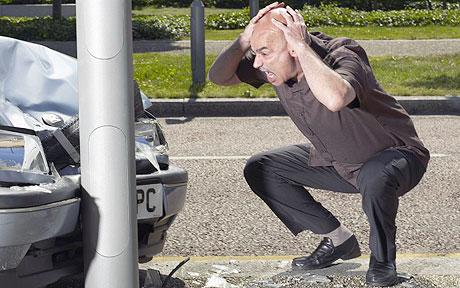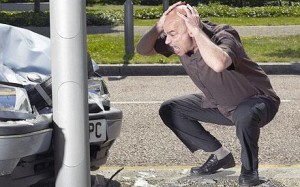Do You Really Need Collision Insurance?

Driving around without some kind of car insurance is illegal in almost every state, so if you own a vehicle you most likely will have to buy insurance. It protects you and others involved in an accident from bearing a steep financial burden, and is considered a social responsibility.
An insurance policy has many parts, and can be very confusing and intimidating. There’s liability and comprehensive, not to mention uninsured motorist. And what in the world is PIP? ( Personal Injury Protection ) Let’s take a few moments to examine one of these more closely.
Collision Insurance – Is it really necessary?
The short answer is maybe. Take a look at the points below to find out more about collision insurance. 
- It covers damage to your car, not the other vehicles involved in an accident
- Collision coverage is not mandatory in any state
- Most banks require collision coverage if you have a loan on the vehicle
- Collision usually has a deductible, and this can save you some money
- The money you get for repairing your car is the market value, if it’s totaled, or the cost of the repair minus your deductible amount
There are those that believe it’s a wise move to drop the collision coverage from their policy once a vehicle reaches a certain age. This can chop some money off your total insurance bill, but may not always be the best move. It’s a very personal decision, and here’s why. Everyone’s situation is different. Check out the points below to see if you should drop collision coverage.
- If you are looking to save money in every possible area, you may be tempted to drop your collision coverage as soon as you own the car outright
- A rule of thumb some people use is to drop collision when the cost of the coverage reaches 10 percent of your vehicle’s value. ( Example: Your car is worth $4000 and the cost of collision insurance is $400 or more )
Be aware that having comprehensive insurance coverage is not the same as having collision. Some people mistakenly believe that the insurance they are “required” to carry will also pay for the repairs to their car if they cause an accident. This is simply not true. If you don’t carry collision insurance, 100 percent of the cost of repairing your car will come out of your pocket if you caused the accident.
Because every vehicle is different, there is no set price for collision. You simply decide on the coverage you think you will need, and your insurance company looks at a few factors and then tells you the price. Your insurance provider should be able to make specific recommendations for you.
Some people feel that if they’re involved in an accident they can always sue the other person to receive funds to use to fix up their vehicle. This doesn’t always work out, however. What if the other party doesn’t carry any liability insurance? How about if you’re the only one involved in an accident?
Remember the important points to consider when deciding on collision insurance. If you’re looking to save some cash, think about increasing your deductible. Just make sure you have enough money on hand to cover the cost if you cause an accident. Additionally, you can drop your collision coverage altogether if you decide that your vehicle is not worth repairing. Dropping collision may seem like a simple decision, but there are many factors that come into play.
Understanding Collision Insurance

When it comes to auto insurance the type of coverages you need to have are largely regulated by state laws and also the terms of an auto loan, if applicable. Since cars are quite expensive most people have to take out a loan to buy a new or used car. These loans generally mandate that you have to buy collision and comprehensive coverage, in addition to the liability coverage which is mandated by state law. While you may not have a lot of choice when it comes down to what type of coverage you choose for your vehicle, it is helpful to understand what is covered by these policies.
What does Collision Insurance cover? 
Since you are required to have this type of coverage if you have an auto loan it is helpful to understand exactly what this covers. The simple explanation is that collision insurance will pay for any damage to your vehicle that occurs while the vehicle is in motion. If your vehicle is parked on the side of the road and a rock hits the vehicle causing damage, this would not be covered under collision, but if you had comprehensive it would fall under that coverage. It is also a good idea to read your policy carefully and especially the exclusions section. Under any policy there are certain things that can result in coverage being denied and these are found in the exclusions section. For example, most auto insurance policies will not cover damages resulting from street racing, or if you are using your vehicle for work purposes.
Why Should I buy Collision Insurance?
The obvious answer is because it is required but even if this is not the case – it is generally a good idea to have this type of auto insurance coverage. Collision insurance provides a safety net to pay for expensive repairs that are a result of an accident. If you are at fault in an accident the coverage will pay for repairs. If another party is at fault you can choose to have your coverage pay for it or deal directly with the responsible parties insurance carrier. If your collision coverage pays for damage that was caused by another driver, your insurance company will seek reimbursement from the other insurance company. This is what is referred to as subrogation and is a term you will commonly see in most insurance policy language.
What does Collision Insurance not cover?
The specifics of what is covered under any insurance policy can be found in the policy language and can differ from one insurer to another. While some insurance companies utilize standard insurance policies that are used throughout the industry, other insurers will develop and use their own policy. This is a practice which is generally only used by the really large insurance companies. Some common items that will not be paid for under a collision claim would be any personal property inside the vehicle such as a laptop, portable electronics, etc. A good rule of thumb to use to figure out what is covered by collision is as follows. If you were to cut the roof off from your car, pick up your car, turn it upside down, and shake it, the items that fall out are not covered and anything that stays in is covered. This is a basic guideline and again, each policy is different so what is covered will depend precisely on the policy language.











